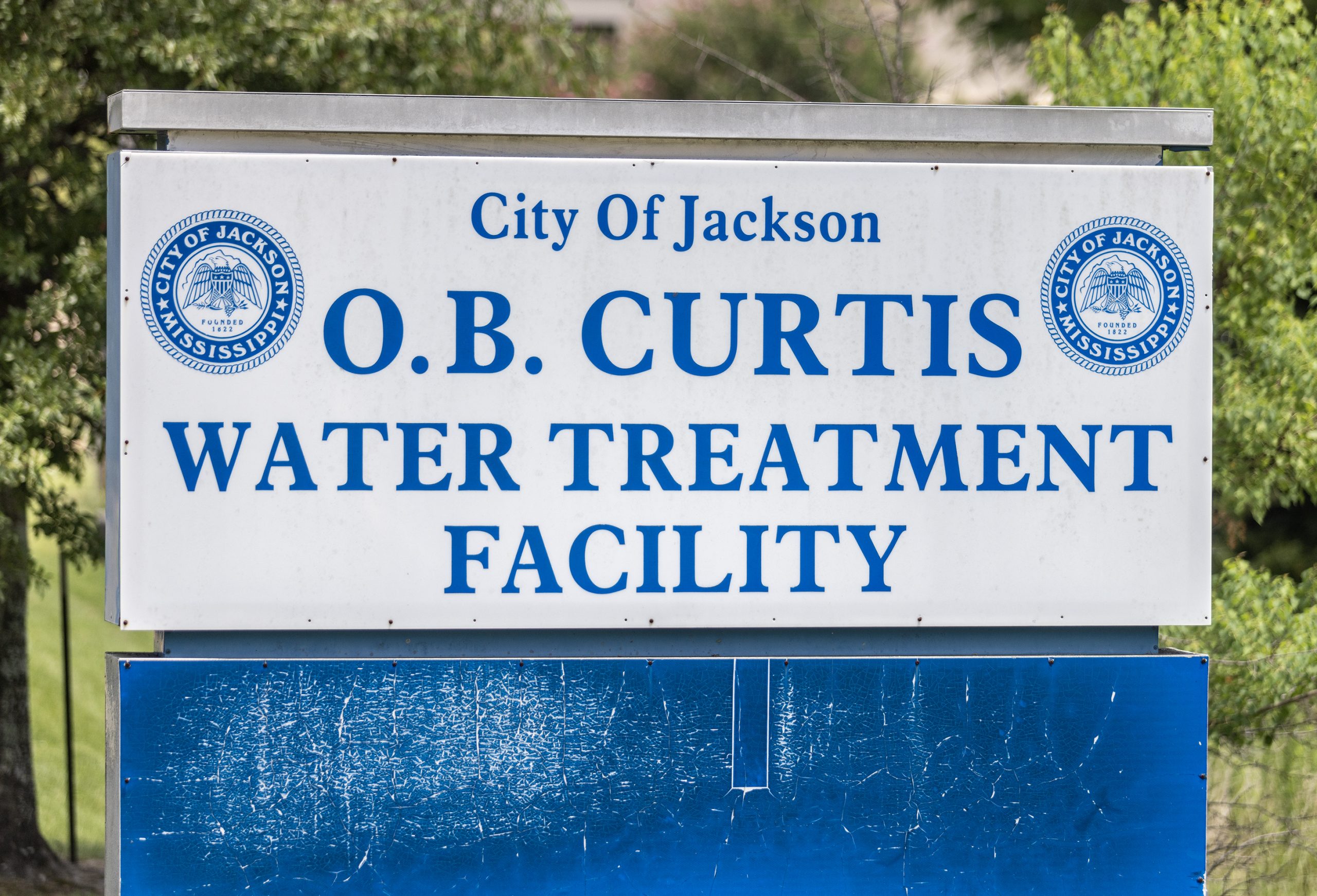Mississippi Today
Senate passes bill removing Jackson’s future control of its water system

The state Senate voted to pass Senate Bill 2628 Tuesday afternoon, moving forward an effort to remove the city of Jackson’s long-term control of its water and sewer systems.
Sen. David Parker, R-Olive Branch, the bill’s author, presented a tweaked version of the legislation that passed out of the Senate Accountability, Efficiency and Transparency Committee last month. If enacted, the legislation would force Jackson into selling its water and sewer infrastructure to a new utility authority, which would operate as a corporate nonprofit. The new authority would be governed by a nine-person board, which would select a president to run day-to-day operations.
The new authority would assume control of the Jackson utilities once the current federally appointed manager of the water and sewer systems, Ted Henifin, leaves his post. U.S. District Court Judge Henry Wingate, who is overseeing manager’s role, assigned Henifin to stay until at least 2027. The court order empowering Henifin, though, requires him to stay until Wingate determines that Jackson’s water system is in a stable enough condition.
In the updated proposal Parker offered Tuesday, the bill gives Jackson officials three board appointees. The original version gave left all appointees for the governor and lieutenant governor to choose. The updated bill, though, still leaves elected city officials with a minority of appointees, and gives Jackson one less appointee than in the version of this bill Parker presented last legislative session.
Specifically, the appointees would work as follows:
- The mayor of Jackson would have one, who would be a member of the clergy leading a place of worship in the city.
- The Jackson City Council would have two: an employee of a local nonprofit in the city, and an owner of a restaurant in the city.
- The governor would have three: an employee of a large nonhealthcare business in the city; a small business owner whose main location is in the city; and an at-large appointee who lives or works in the city.
- And the lieutenant governor would have the remaining three: an employee of a large health care facility in the city; an employee of a post-secondary institution in the city; and an at-large appointee who lives or works in the city.
Parker said he made the adjustment after hearing feedback from Jackson delegates as well as Henifin.
The bill also now requires the board to hold monthly meetings. Those meetings would be subject to the Open Meetings Act, and all records of the authority would be considered public records.
During Tuesday’s floor discussion, Sen. Hillman Terome Frazier and Sen. Sollie Norwood, both of whom represent Jackson, questioned Parker for not meeting with them individually before presenting the bill. Parker responded that neither came to his office to meet, and that he left notes about the legislation on their desks.
After the bill passed out of its committee last month, Jackson lawmakers criticized Parker, as well as Henifin who, shortly after, endorsed the proposal. The Jackson City Council also passed a resolution in opposition to the effort.
SB 2628 passed the Senate on Tuesday by a vote of 35-14, and the bill will now head to the House. To stay alive, the proposal will have to pass out of a House committee by the April 2 deadline.
This article first appeared on Mississippi Today and is republished here under a Creative Commons license.![]()
Mississippi Today
Mississippi lawmakers end 2025 session unable to agree (or even meet about) state budget: Legislative recap
Infighting between Mississippi’s Republican House and Senate legislative leaders reached DEFCON 4 as the 2025 legislative session sputtered to a close last week.
Lawmakers gaveled out unable to set a $7 billion state budget — their main job — or to even agree to negotiate. Gov. Tate Reeves will force them back into session sometime before the end of the fiscal year June 30. At a press conference last week, the governor assured he would do so but did not give a timetable, other than saying he plans to give lawmakers some time to cool off.
The crowning achievement of the 2025 session was passage of a tax overhaul bill a majority of legislators accidentally voted for because of errors in its math. House leaders and the governor nevertheless celebrated passage of the measure, which will phase out the state individual income tax over about 14 years, more quickly trim the sales tax on some groceries to 5% raise the tax on gasoline by 9 cents a gallon, then have automatic gas tax increases thereafter based on the cost of road construction.
The error in the Senate bill accidentally removed safeguards that chamber’s leadership wanted to ensure the income tax would be phased out only if the state sees robust economic growth and controls spending.
The rope-a-dope the House used with the Senate errors to pass the measure also stripped a safeguard House leaders had wanted: a 1.5 cents on the dollar increase in the state’s sales tax, which would have brought it to 8.5%. House leaders said such an increase was needed to offset cutting more than $2 billion from the state’s $7 billion general fund revenue by eliminating the income tax, and to ensure local governments would be kept whole.
Reeves was nonplussed about the flaws in the bill he signed into law (at one point denying there were errors in it) and called it “One big, beautiful bill,” borrowing a phrase from President Donald Trump.
Quote of the Week
“Quite frankly, I think it’s chicken shit what they did.” — Gov. Tate Reeves, at a press conference last week when asked his thoughts about the Senate rejecting his nomination of Cory Custer, Reeves’ deputy chief of staff, to serve as four-year term on the board of Mississippi Public Broadcasting.
Full Legislative Coverage
What happened (or didn’t) in the rancorous 2025 Mississippi Legislative session?
Mississippi Today’s political team unpacks the just ended — for now — legislative session, that crashed at the end with GOP lawmakers unable to pass a budget after much infighting among Republican leaders. The crowning achievement of the session, a tax overhaul bill, was passed by accident and full of major errors and omissions. Listen to the podcast.
Gov. Tate Reeves, legislative leaders tout tax cut, but for some, it could be a tax increase
Many of those retirees who do not pay an income tax under state law and other Mississippians as well will face a tax increase under this newly passed legislation touted by Reeves and others. Read the column.
Trump administration slashes education funding. Mississippi leaders and schools panic
Mississippi schools and the state education system are set to lose over $137 million in federal funds after the U.S. Department of Education halted access to pandemic-era grant money, state leaders said this week. Read the story.
Gov. Tate Reeves says he’ll call Mississippi lawmakers back in special session after they failed to set budget
Gov. Tate Reeves on Thursday said he will call lawmakers into a special session to adopt a budget before state agencies run out of money later in the summer and hinted he might force legislators to consider other measures. Read the story.
GOP-controlled Senate rejects governor’s pick for public broadcasting board. Reeves calls it ‘chicken s–t’
The Senate on Wednesday roundly rejected the nomination of Cory Custer, Reeves’ deputy chief of staff, to serve a four-year term on the board of directors of Mississippi Public Broadcasting, the statewide public radio and television network. Reeves reacted to the Senate’s vote on Thursday, calling it “chicken shit.” Read the story.
Early voting proposal killed on last day of Mississippi legislative session
Mississippi will remain one of only three states without no-excuse early voting or no-excuse absentee voting. Read the story.
Mississippi Legislature ends 2025 session without setting a budget over GOP infighting
The House on Wednesday voted to end what had become a futile legislative session without passing a budget to fund state government, for the first time in 16 years. The Senate is expected to do the same on Thursday. Read the story.
Mississippi Legislature approves DEI ban after heated debate
Mississippi lawmakers have reached an agreement to ban diversity, equity and inclusion programs and a list of “divisive concepts” from public schools across the state education system, following the lead of numerous other Republican-controlled states and President Donald Trump’s administration. Read the story.
Fear and loathing: Legislative session crashes with lawmakers unable to set a budget because of Republican infighting
Republican Lt. Gov. Delbert Hosemann and other Senate leaders on Saturday excoriated the Republican House leadership, after the House didn’t show up for what was supposed to be “conference weekend” to haggle out a $7 billion budget. Read the story.
‘We’ll go another year’ without relief: Pharmacy benefit manager reform likely dead
Hotly contested legislation that aimed to increase the transparency and regulation of pharmacy benefit managers appeared dead in the water Tuesday after a lawmaker challenged the bill for a rule violation. Read the story.
This article first appeared on Mississippi Today and is republished here under a Creative Commons Attribution-NoDerivatives 4.0 International License.
The post Mississippi lawmakers end 2025 session unable to agree (or even meet about) state budget: Legislative recap appeared first on mississippitoday.org
Mississippi Today
On this day in 1909, Matthew Henson reached the North Pole
April 6, 1909

Matthew Henson reached the North Pole, planting the American flag. Traveling with the Admiral Peary Expedition, Henson reportedly reached the North Pole almost 45 minutes before Peary and the rest of the men.
“As I stood there on top of the world and I thought of the hundreds of men who had lost their lives in the effort to reach it, I felt profoundly grateful that I had the honor of representing my race,” he said.
While some would later dispute whether the expedition had actually reached the North Pole, Henson’s journey seems no less amazing.
Born in Maryland to sharecropping parents who survived attacks by the KKK, he grew up working, becoming a cabin boy and sailing around the world.
After returning, he became a salesman at a clothing store in Washington, D.C., where he waited on a customer named Robert Peary. Pearywas so impressed with Henson and his tales of the sea that he hired him as his personal valet.
Henson joined Peary on a trip to Nicaragua. Impressed with Henson’s seamanship, Peary made Henson his “first man” on the expeditions that followed to the Arctic. When the expedition returned, Peary drew praise from the world while Henson’s contributions were ignored.
Over time, his work came to be recognized. In 1937, he became the first African-American life member of The Explorers Club. Seven years later, he received the Peary Polar Expedition Medal and was received at the White House by President Truman and later President Eisenhower.
“There can be no vision to the (person) the horizon of whose vision is limited by the bounds of self,” he said. “But the great things of the world, the great accomplishments of the world, have been achieved by (people with) … high ideals and … great visions. The path is not easy, the climb is rugged and hard, but the glory at the end is worthwhile.”
Henson died in 1955, and his body was re-interred with full military honors at Arlington National Cemetery. The U.S. Postal Service featured him on a stamp, and the U.S. Navy named a Pathfinder class ship after him. In 2000, the National Geographic Society awarded him the Hubbard Medal.
This article first appeared on Mississippi Today and is republished here under a Creative Commons Attribution-NoDerivatives 4.0 International License.![]()
Mississippi Today
A win for press freedom: Judge dismisses Gov. Phil Bryant’s lawsuit against Mississippi Today
Madison County Circuit Court Judge Bradley Mills dismissed former Gov. Phil Bryant’s defamation lawsuit against Mississippi Today on Friday, ending a nearly two-year case that became a beacon in the fight for American press freedom.
For the past 22 months, we’ve vigorously defended our Pulitzer Prize-winning reporting and our characterizations of Bryant’s role in the Mississippi welfare scandal. We are grateful today that the court, after careful deliberation, dismissed the case.
The reporting speaks for itself. The truth speaks for itself.
This judgment is so much more than vindication for Mississippi Today — it’s a monumental victory for every single Mississippian. Journalism is a public good that all of us deserve and need. Too seldom does our state’s power structure offer taxpayers true government accountability, and Mississippians routinely learn about the actions of their public officials only because of journalism like ours. This reality is precisely why we launched our newsroom nine years ago, and it’s why we devoted so much energy and spent hundreds of thousands of dollars defending ourselves against this lawsuit. It was an existential threat to our organization that took time and resources away from our primary responsibilities — which is often the goal of these kinds of legal actions. But our fight was never just about us; it was about preserving the public’s sacred, constitutional right to critical information that journalists provide, just as our nation’s Founding Fathers intended.
Mississippi Today remains as committed as ever to deep investigative journalism and working to provide government accountability. We will never be afraid to reveal the actions of powerful leaders, even in the face of intimidation or the threat of litigation. And we will always stand up for Mississippians who deserve to know the truth, and our journalists will continue working to catalyze justice for people in this state who are otherwise cheated, overlooked, or ignored.
We appreciate your support, and we are honored to serve you with the high quality, public service journalism you’ve come to expect from Mississippi Today.
READ MORE: Judge Bradley Mills’ order dismissing the case
READ MORE: Mississippi Today’s brief in support of motion to dismiss
This article first appeared on Mississippi Today and is republished here under a Creative Commons Attribution-NoDerivatives 4.0 International License.
-

 Mississippi Today6 days ago
Mississippi Today6 days agoPharmacy benefit manager reform likely dead
-

 News from the South - Alabama News Feed7 days ago
News from the South - Alabama News Feed7 days ago'I think everybody's concerned': Mercedes-Benz plant eyeing impact of imported vehicle tariffs
-

 News from the South - Florida News Feed6 days ago
News from the South - Florida News Feed6 days agoFlorida special election results: GOP keeps 2 U.S. House seats in Florida
-

 News from the South - South Carolina News Feed4 days ago
News from the South - South Carolina News Feed4 days agoSouth Carolina clinic loses funding due to federal changes to DEI mandates
-

 Mississippi Today6 days ago
Mississippi Today6 days agoRole reversal: Horhn celebrates commanding primary while his expected runoff challenger Mayor Lumumba’s party sours
-

 News from the South - Kentucky News Feed5 days ago
News from the South - Kentucky News Feed5 days ago3 killed in fiery Lexington crash temporarily shuts down portion of New Circle Road
-

 News from the South - Louisiana News Feed6 days ago
News from the South - Louisiana News Feed6 days agoMother turns son's tragedy into mental health mission
-

 News from the South - Georgia News Feed6 days ago
News from the South - Georgia News Feed6 days agoMassive CDC layoffs begin in Atlanta | FOX 5 News
















































